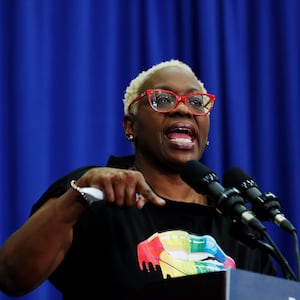In her 2021 speech conceding to now-Rep. Shontel Brown (D), progressive firebrand Nina Turner didn’t bow out with cheery congratulations to her opponent. Instead, she gave a warning.
“I am going to work hard to ensure that something like this doesn’t happen to another progressive candidate again. We didn’t lose this race. Evil money manipulated and maligned this election,” she said.
Now, just nine months after their last nasty and nationalized primary, Turner’s putting that promise to the test and running against Brown all over again. In doing so, she’s embarked on an uphill battle, with money, outside players and the power of Brown’s incumbency working against her.
“Every time I come home it seems like there’s another ‘paid for by,’” Turner said, referencing outside groups spending money against her. “They’re making up super PACs now to come at me… It’s just really unbelievable.”
Their initial primary became a case study in the rifts between moderate and progressives within the Democratic Party—and still has a similar impact this cycle.
And while Turner and Brown’s last matchup wasn’t long ago, their playing field has dramatically shifted in the months since. At the start of their special-election primary last year, Turner was an outspoken former state senator with close ties to the progressive movement writ large. She had a massive social media following. She initially had a strong lead in fundraising, outpacing Brown, who’d been a city councilor and a county Democratic Party chair.
But the tables have turned since Brown cashed in her ticket to Capitol Hill.
Brown’s now an incumbent with a record to run on and a relatively progressive voting streak and membership in Congressional Progressive Caucus. Since being elected, she’s voted for the bipartisan infrastructure bill and Democrat’s signature social-spending bill, the Build Back Better Act.
“She’s a pragmatic progressive, but she’s focused on taking care of Cleveland and making sure that her district has the infrastructure funding and the constituent service and all this other sort of stuff that you need from a good member of Congress. And I think that’s why she’s gonna win,” said Aaron Pickrell, a Democratic strategist in Ohio.
“Because it’s not about how you highlight a national progressive issue. It’s about Cleveland,” Pickrell added.
Brown also voted in favor of the 2022 government spending bill—though critics say she overstated her role in that win.
In a Facebook post, Brown said she “secured” $7 million in funding for projects in Northeast Ohio. But the deadline for lawmakers to submit proposals for funding projects in the bill was before Brown was elected to office. That funding was instead secured by Sen. Sherrod Brown (D-OH)— a point the Turner campaign has seized on in an attack ad against the congresswoman.
But Sen. Brown, who is not related to Rep. Brown, doesn’t seem to mind. On Tuesday, he endorsed Rep. Brown for re-election. Rep. Brown’s campaign did not respond to a request for comment on the matter.
“Since her first day in Congress, Congresswoman Shontel Brown has continued her tradition of working for her constituents and our community,” Sen. Brown said in a statement. “I know she will continue to deliver for Ohioans in the years to come.”
Turner, by contrast, remains a more outspoken progressive that seems destined for a spot in the so-called Squad. A longtime booster of Sen. Bernie Sanders (I-VT), she’s been critical of President Joe Biden during the 2020 election and onward, and has been floated as a potential 2024 presidential primary contestant, potentially to challenge Biden himself. Turner declined to comment on the presidential rumors to The Daily Beast, stating only that she’s focused on her current race.
In 2021, Turner received endorsements from the who’s who of the progressive left, including Sanders and Reps. Alexandria Ocasio-Cortez (D-NY), Ayanna Pressley (D-MA), Ilhan Omar (D-MN) and Rashida Tlaib (D-MI).
This time around, Sanders has publicly reupped his support. Turner has also continued to draw support from plenty of progressive groups, and the Cleveland Plain Dealer, which said that Brown came across in an interview as “congenial and pleasant, but often leaves the impression she’s speaking talking points, not convictions.”
Turner acknowledged that it is “somewhat more challenging” for more prominent politicians to come out against an incumbent, even if that incumbent has been in office for a short time.
But Turner argued her endorsements from last cycle prove she can build a coalition.
“I didn’t feel the need to try to prove that this time—to have to do that this time—instead, using my energy other places,” she said.
Jeff Rusnak, an Ohio Democratic strategist who worked for Sen. Bernie Sanders in 2016 but has supported Brown, said he thinks Turner’s decision to lean into support from D.C. progressives hurt her last cycle, potentially turning off more moderate voters. He added that, from his own perspective, the Turner campaign has been quieter this time around.
“I know people in both campaigns—it’s eerily quiet, and especially from the Turner campaign. I do see TV ads. I’ve seen the Brown TV ads. I’ve seen the [independent expenditure] TV ads for Shontel Brown. We’ve probably received five or six pieces of mail either from the Brown campaign or for Brown. I received one mailer—one [independent expenditure] mailing—in support of Turner. And that’s it,” Rusnak said.
Not unlike last cycle, Brown has drawn a slew of outside support from PACs and individuals more closely aligned with the so-called Democratic establishment. House Speaker Nancy Pelosi’s campaign committee and the political action committee for the moderate New Democrats Coalition have donated to her reelection effort. She’s been endorsed by the Congressional Progressive Caucus PAC, which has a policy against endorsing challengers to sitting incumbents. PACs bankrolled by cryptocurrency interests and oil moguls are backing her candidacy, too.
Turner has used that influx of outside money as an attack against Brown.
“Everybody should be concerned about this, whether I’m their candidate or not, that big money can overpower the will of the people and manipulate situations on the ground,” Turner said.
But whether the message resonates with voters remains to be seen.
Brown defeated Turner in their last primary by just over 5 points. Ohio’s 11 district is heavily Democratic, meaning the winner of the primary will likely win the general election. Last cycle, Brown bested the district’s Republican nominee, Laverne Gore, by more than 57 points.
But as Turner and Brown trudge on with their rematch, there’s no guarantee voters are paying as much attention this time around.
Ohio Democratic strategists said voter fatigue in the district is certainly a factor. While most voters nationwide have had a year or two off from their airways being flooded with political advertisements and their mailboxes plugged with campaign flyers, a springtime primary is giving these Ohio voters whiplash.
Brown and Turner’s race also doesn’t have the same stage it did last year when the two faced off in a special election to replace Housing and Urban Development Secretary Martha Fudge.
This time around, their House race is happening in tandem with all other House races in Ohio. The state is also being swamped by an increasingly wild Senate race, in which Democratic Rep. Tim Ryan (D) seems en route to win his party nomination while the Republican field has nearly come to blows in the fierce competition to attract a Trump endorsement (J.D. Vance prevailed).
“This U.S. Senate Republican primary is bombarding the airwaves with everything anyway. So, I think a lot of this stuff is probably just getting washed around and people aren’t absorbing it as much,” Pickrell told The Daily Beast of Turner and Brown’s race.
Voters may also have grown tired of the negative tone of the race, Rusnak said.
“I thought people were turned off in the last election, in particular in this race and how divisive it was,” he said. “The environment here is ugly, it’s mean. And again, I think people are just turned off by that and have had enough.”
Unsurprisingly, given the tense nature of the race, Turner says she and Brown have not spoken this cycle.
Voters for Brown and Turner could also be subject to some confusion on election day, due to Ohio’s botched redistricting process. Democrats and Republicans in the state are in an ongoing battle over how to draw the state’s new district lines, to the point that candidates and voters have no guarantee on the bounds of their representation. Turner said she is going off the map proposed in the Ohio legislature in March, but said “still, it could change.”
Early voting in the district is already underway—and the primary election is May 3. Turner remains hopeful for an upset.
“Even in the face of all of this money being thrown at us” she said. “We’re still forging ahead in a very strong fashion.”








